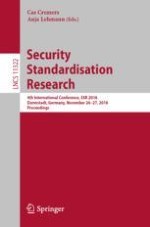2018 | OriginalPaper | Chapter
The New Randomness Beacon Format Standard: An Exercise in Limiting the Power of a Trusted Third Party
Author : John Kelsey
Published in: Security Standardisation Research
Publisher: Springer International Publishing
Activate our intelligent search to find suitable subject content or patents.
Select sections of text to find matching patents with Artificial Intelligence. powered by
Select sections of text to find additional relevant content using AI-assisted search. powered by
